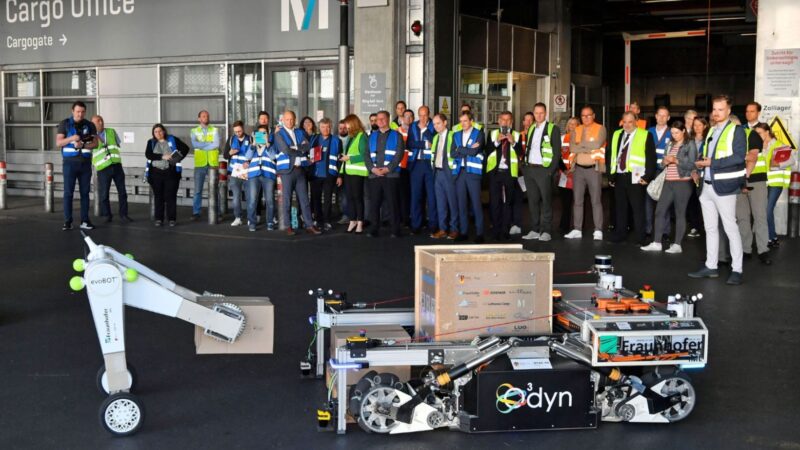“Robot dog” patrols Munich Airport to showcase digital cargo handling capabilities
A “robot dog” has been going for walkies autonomously through Munich Airport’s cargo warehouse as part of a project that aims to explore the potential of digital technologies in shaping the future of air cargo handling.
During a demonstration, which is part of the Digital Testbed Air Cargo (DTAC) project, several other AI and autonomous devices were shown to either completely take over some labour-intensive and repetitive steps during cargo handling processes, or support employees in their physically demanding work.
Dr. Jan-Henrik Andersson, chief commercial officer and chief security officer of Munich Airport, said: “Considering the increasing volume of air cargo and the staff recruitment challenges, digitalisation and robotics will help us make cargo and baggage handling more efficient and jobs in these areas more attractive in the near future.”
On May 13, in front of an audience of numerous high-ranking representatives from politics, industry, administration, and the media, researchers from the Fraunhofer Institute for Material Flow and Logistics IML demonstrated the initial results of the DTAC research project which has been running at Munich Airport.
The DTAC project includes a consortium of researchers from Fraunhofer IML, together with Frankfurt University of Applied Sciences, insurance company KRAVAG and industrial partners at Munich Airport, including Cargogate, CHI, Sovereign Speed and DB Schenker.
Funded by the German Federal Ministry for Digital and Transport with approximately €7 million, the DTAC project will run until September 2024, and is focused on exploring how the efficiency and performance of the air freight transport chain can be optimised.
Spot and its automated friends
Named Spot, the “robot dog” from US manufacturer Boston Dynamics is equipped with a scanner and 4K camera. For the demonstration project, Spot patrolled Munich Airport’s cargo warehouse autonomously and identified large storage pallets ready for storage and the corresponding storage locations.
Then, an autonomously operating forklift took over the intermediate transport to the automated high-bay warehouse and the omnidirectional, highly dynamic robot O³dyn (developed by Fraunhofer IML) was responsible for transporting Euro-pallets to a neighbouring warehouse.
Next, an evoBOT, also developed by Fraunhofer IML – a dynamically stable system with two gripper arms based on the principle of an inverse pendulum and requiring no external counterweight – placed packages from a Euro-pallet onto the conveyor belt of an X-ray machine and back onto the pallet after the X-ray process. These processes were steered via the Fraunhofer control system software ‘openTCS’ – a low-threshold tool for coordinating automated guided vehicles (AGVs).
Although some of the process steps during the demonstration project were not fully autonomous and some processes were controlled manually, the researchers believe that the degree of automation in air cargo handling will increase rapidly.
Prof. Michael Henke, executive director of Fraunhofer IML, said: “In the future, artificial intelligence (AI) will support us in coordinating and controlling the vehicles. It will provide the necessary tools and algorithms with which we can precalculate the routes of the autonomous robots and safely avoid collisions.
“Ultimately, we will soon have fully autonomous systems that will make the air cargo industry fit for the future.”
Christian Bernreiter, Bavarian State Minister for Housing, Construction and Transport, said: “This was a convincing demonstration that shows that we are very well prepared for current and future challenges. This is particularly important in the air cargo industry.
“The industry has to manage the split between shortage of staff on the one hand and high throughput rates on the other. This will only be successful if we make use of all the technological developments available to us for process optimisation.”
READ MORE NEWS: Climate protestors disrupt flights at Munich airport

